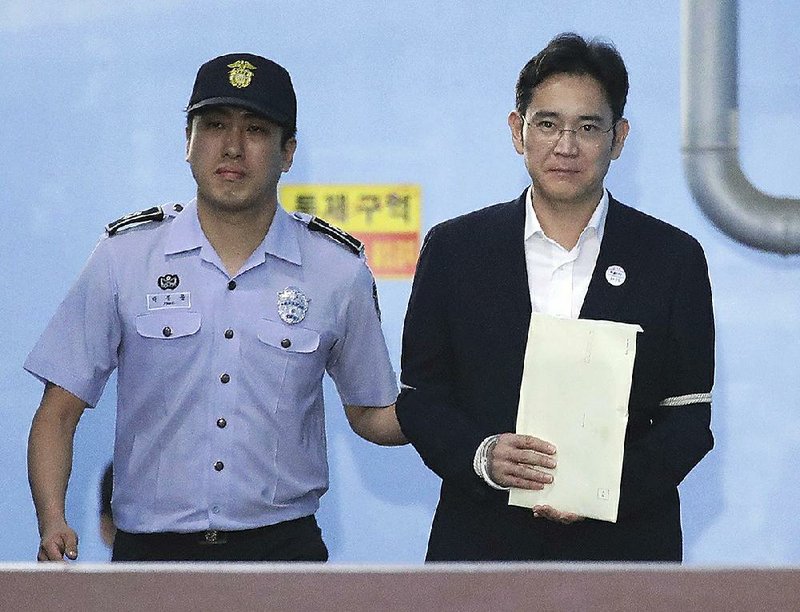SEOUL, South Korea -- A South Korean court Friday convicted Lee Jae-yong, the heir to the Samsung business empire, of bribery and embezzlement and sentenced him to five years in prison, in a dramatic break with the country's history of dealing light penalties to big business leaders.
The verdict sends the strongest message yet to South Korea's big, family-controlled businesses that their more than 60 years of economic dominance in one of the world's most successful economies is under threat. Those companies helped build an economic powerhouse out of the ashes of the Korean War. Today, they are widely seen as sources of corruption and impediments to the country's progress.
It also presents new challenges for Samsung, a constellation of businesses so vast that it accounts for about one-fifth of South Korea's exports by itself. The electronics company has argued that Lee provided long-term strategic vision and helped cement alliances with key partners Apple and Google.
The court ruled that Lee and four other Samsung executives paid $6.4 million in bribes and other inducements to ensure that the country's disgraced former president, Park Geun-hye, supported a complicated corporate deal that strengthened Lee's grip on Samsung Electronics, the conglomerate's crown jewel.
While the Samsung executives never expressly asked for Park's support, the court said, they made the payments to a secret confidant of the former president's with a wink-and-nod understanding characteristic of the way that many South Koreans believe big businesses manipulate politicians. The list of bribes included $3.2 million sent to a front company owned by the confidant, Choi Soon-sil, as well as thoroughbred horses of a similar worth that the company gave to Choi's daughter.
"The essence of this case is the unethical bond between politics and money," Judge Kim Jin-dong said. "The people expect that the power of a president, the top authority under the constitution, will be used to serve all people and that big businesses act with social responsibility, through legal economic activities."
"Through this case," he continued, "the people have come to question the fairness and honesty of the president and have come to distrust the ethical values of Samsung, the largest conglomerate."
Lee was also found guilty of hiding assets overseas and of perjury for falsely testifying at a parliamentary hearing on the scandal. Other former top executives who advised Lee were also sent to prison or given suspended terms.
Lee, in a navy blue suit and white shirt, occasionally applied lip balm and kept a cool facial expression, which didn't change as the verdict was announced, according to South Korea's Yonhap News Agency. Lee, who has been in jail since he was arrested earlier this year, was led back into custody.
Lee's attorneys immediately said they would appeal, and experts said it would likely go all the way to the country's supreme court.
"As a legal professional, I cannot possibly accept any part of the lower court's guilty verdicts," said Song Wu-cheol, lead defense attorney, who added, "I am confident that the appeals court will definitely find the defendants not guilty on all counts."
Traditionally in South Korea, powerful executives who have been convicted of crimes have managed to avoid big prison terms through commuted sentences and even presidential pardons. Perhaps the most prominent example was Lee's father, Lee Kun-hee, the second-generation leader of Samsung who transformed its electronics business into a globally respected corporate name that competes with the likes of Apple and Sony. Twice convicted of tax evasion and bribery, the elder Lee never spent any time in prison.
This time could be different.
Public perception in South Korea toward the country's biggest family-controlled business empires has changed in recent years as scandals have mounted and as the economy has matured, making them less appealing in an era of entrepreneurship and startups. In the wake of the corruption scandal -- which led to the impeachment of Park -- the current president, Moon Jae-in, campaigned on holding South Korea's corporate empires to account.
"We hope this will be the first step in cutting the stubborn ties of corruption between politics and business, which has been a roadblock to progress in our society," said Yoon Young-chan, senior secretary at the Blue House, the South Korean president's executive office and residence.
The decision will test whether Samsung can succeed without the crown prince of the Lee family at the helm. The conglomerate includes the world-famous electronics maker as well as drug manufacturing, shipbuilding and other businesses. Lee has two sisters, but neither has been heavily involved in Samsung Electronics, which is widely regarded as the center of the Samsung empire. Some of South Korea's family companies have also been famously controlled from jail cells. Lee Kun-hee, the current chairman of Samsung Electronics, slipped into a coma three years ago.
Business on 08/26/2017
